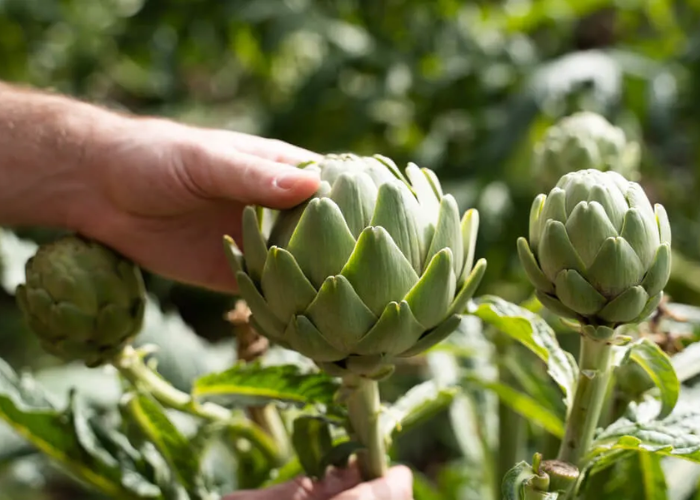Companion plants are a great way to help your garden thrive and artichoke is no exception. Artichoke is a hardy perennial vegetable that is not only delicious when cooked but also provides many benefits to its companion plants. Artichokes can be planted with a variety of other crops, such as tomatoes, peppers, and even herbs, to provide a mutually beneficial relationship. This article will discuss how artichoke can be used as a companion plant and the various benefits it can provide to your garden.
What are Companion Plants?
Companion plants are plants that are beneficial to other plants when grown together. Artichoke is an excellent companion plant for many vegetables, herbs, and flowers. Artichokes provide nitrogen for the soil, help attract beneficial insects to pollinate plants, and act as a natural deterrent to pests.
Artichokes also act as a living mulch to retain moisture, reduce weeds, and cool the soil. When planted near other vegetables and herbs, Artichokes help to improve the growth and production of other plants.
In addition, Artichokes have a number of other benefits, including acting as a trap crop for insects and providing a beautiful backdrop for a garden. Artichokes are easy to care for and require minimal maintenance, making them ideal for beginner gardeners.
Benefits of Companion Planting Artichoke
Companion planting is a great way to maximize garden space and encourage beneficial insects. Artichoke is one of the best companion plants for your vegetable garden. Artichoke plants create a dense canopy, providing shade for other plants, and their deep roots bring up nutrients from the lower soil layers.
Artichoke also releases beneficial compounds that help protect plants from pests and disease, making them a great choice for companion planting. In addition, Artichokes also attract beneficial insects like bees and ladybugs that help pollinate other plants and keep harmful insect populations in check.
Furthermore, the large leaves of the artichoke plant provide a natural mulch that helps to retain moisture in the soil and reduce weeds. All in all, companion planting artichoke is an excellent way to encourage a healthy garden.
What to Consider When Planting Artichokes with a Companion Plant
When planting artichokes with a companion plant, there are several things to consider. Firstly, the type of companion plant should be chosen based on the type of artichoke being planted. Some companion plants, such as nasturtium, are known to help ward off pests, while others, like oregano, can help to enrich the soil.
Additionally, it is important to ensure that the companion plant does not compete with the artichoke for resources such as water, light, and nutrients. Generally, companion plants that are low-growing and require less water and nutrients than artichokes make good partners.
Finally, it is important to choose companion plants that will not interfere with the artichoke’s growth and development. A good rule of thumb is to select plants that are not overly aggressive in their growth and will not overshadow the artichoke.
Best Companion Plants for Artichoke
Companion planting is a great way to enhance the health and yield of your artichoke crop. Artichoke plants require plenty of sun and well-drained soil for optimal growth, but with the right companion plants, you can maximize the benefits of your artichoke garden.
Some of the best companion plants for artichokes are tomatoes, garlic, onions, basil, and marigolds. Tomatoes help to reduce the number of pests that can invade your artichoke crop.
Garlic and onions can help to repel pests and can also improve the flavor of the artichoke heads. Basil can help to improve the flavor of the artichoke and can also help attract beneficial insects.
Lastly, marigolds can repel pests, attract beneficial insects, and improve the overall health of your artichoke crop. Each of these plants can work together to create the perfect environment for your artichoke crop.
How to Successfully Plant a Companion for Artichokes
Planting artichokes in the garden can be a rewarding experience, as these hearty vegetables are packed with vitamins and minerals. However, growing them can also be a challenge, as they require a great deal of attention and care.
Fortunately, companion planting with artichokes is a great way to ensure their success. By planting other species alongside artichokes, gardeners can provide additional nutrients and protection from garden pests.
Additionally, companion plants can improve the overall health of the soil, providing a better environment for the artichokes to thrive. For gardeners looking to ensure successful artichoke crops, some of the best companion plants for artichokes include garlic, onions, marigolds, and lavender.
Garlic is a great companion for artichokes, as it helps to repel common garden pests such as aphids and Japanese beetles. Onions also serve a similar purpose and can be planted near the artichokes to help protect them.
Marigolds are another excellent companion plant for artichokes, as they are known to repel nematodes, which can cause root rot and damage to artichoke roots. Finally, lavender can be planted around artichokes to attract beneficial insects and ward off harmful ones.
By planting these companion plants alongside artichokes, gardeners can better ensure success for their crops. Additionally, companion plants like garlic, onions, marigolds, and lavender can help to improve the overall health of the soil, resulting in better yields and more vigorous plants. With the right combination of companion plants, gardeners can enjoy a bountiful harvest of artichokes
Conclusion
The artichoke is a wonderful companion plant for many different types of gardens. Not only does it provide a wonderful edible crop, but its unique and attractive foliage makes it an attractive addition to any landscape.
It also provides protection for nearby plants by attracting beneficial insects to the garden. Its hardiness makes it a great choice for gardeners who want to create a low-maintenance gardening experience. When planted correctly, artichoke plants can provide a lifetime of enjoyment and satisfaction.


